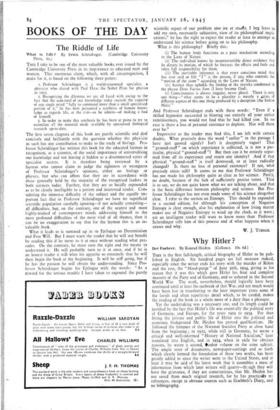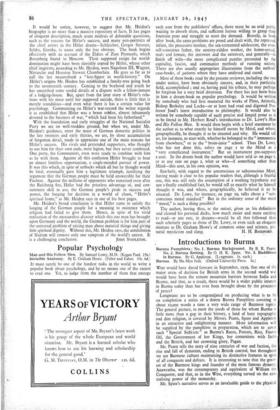Why Hitler ?
Der Fuehrer. By Konrad Heiden. (Gollancz. 10s. 6d.)
Tms is the first full-'length, critical biography of Hitler to be pub- lished in English. Six hundred pages are full measure indeed, especially since the writer ends his story with the murder of Rohm and the rest, the " blood-purge " of June 30th, 1934, giving as his reason that it was this which gave Hitler his final and complete - mastery of the Party and of Germany, and so ushered in the Second World War. The work, nevertheless, should logically have been continued until at least the outbreak of that War, and not much would have been lost in transferring to the later important years some of the lavish and often repetitious detail which, to be candid, makes the reading of the book as a whole more of a duty than a pleasure.
Yet the undertaking was a necessary one, and its length could be justified by the fact that Hitler's life was essentially the political story of Germany, and Europe, for the years 1920 to 5934. For thus fitting the private and public life of Hitler into the political and economic. background Mr. Heiden has proved qualifications. He followed the fortunes of the National Socialist Party at close hand from the beginning ; in 5932 while still in Germany, he wrote a critical and well-informed "History of National Socialism," later translated into English, and in 5934, when in exile for obvious reasons, he wrote a second,Altanker volume on the same subject. The ample store of documents, newspaper-cuttings and so forth which clearly formed the foundation of these two works, has been greatly added to since the writer went to the United States, and at least it may be said of his latest work that it assembles a mass of information from which later writers will quarry—though they will have the grievance, if they are conscientious, that Mr. Heiden has not saved them much original research, for he has practically no references, except to obvious sources such as Goebbels's Diary, and no bibliography.
It would be unfair, however, to suggest that Mr. Heiden's biography is no more than a massive repository of facts. It has pages of eloquent description, much acute analysis of debatable questions, such as the reasons for Hitler's success, and many pen-portraits of the chief actors in the Hitler drama—Schleicher, Gregor Strasser, Seldte, Gereke, to name only the less obvious. The book begins effectively with an account of the Elders of Zion Protocols, which Rosenberg found in Moscow. Their supposed recipe for world- domination might have been slavishly copied by Hitler, whose other chief inspirers, according to Mr. Heiden, were Napoleon III, Wagner, Nietzsche and Houston Stewart Chamberlain. He goes so far as to call the last mountebank a "key-figure in world-history." On Hitler's origins Mr. Heiden has established a family-tree going back to the seventeenth century. Coming to the boyhood and youth he has unearthed some sordid details of a dispute with a fellow-inmate of a lodging-house. But, apart from the later story of Hitler's rela- tions with his niece until her supposed suicide, there is little that is merely scandalous—and even What there is has a certain value for psychology. Commenting on Hitler's war-record the writer regards it as established that Hitler was a brave soidier, almost inhumanly devoted to the business of war, "which had been his fatherland."
With the foundation and early struggles of the National Socialist Party we are on well-trodden ground, but when we, under Mr. Heiden's guidance, enter the maze of German domestic politics in the late twenties and early thirties, we are, by sheer accumulation of ‘forgotten detail, made to appreciate one of the main reasons for Hitler's success. His rivals and pretended supporters, who thought to use him for their own ends, were legion, but they never combined. One party, the Communists, even were ready to combine with him as he with them. Against all this confusion Hitler brought to bear an almost limitless opportunism, a single-minded pursuit of power. It was this which, in spite of setbacks which all but he thought would be fatal, eventually gave him a legitimate triumph, justifying the argument that the German people must be held answerable for their Fuehrer. Against the millions of opponents who remained even after the Reichstag fire, Hitler had the priceless advantage of, and con- suinmate skill to use, the German people's pride in success and power, the longing for decision in a world of chaos, "Hitler's spiritual home," as Mr. Heiden says in one of his best pages.
Mr. Heiden's broad conclusion is that Hitler came to satisfy the longing of the German people for a meaning to existence which religion had failed to give them. Hence, in spite of his vivid realisation of the measureless disaster which this one man has brought upon Germany and the world, the German problem is for him part of the universal problem of raising man above material things and giving him spiritual dignity. Without this, Mr. Heiden says, the annihilation of Nazism will remove only one symptom of the world's unrest. It



























 Previous page
Previous page